What to do to stop climate change?
Even with little things we can help our environment a lot. That is why we would like to change people’s mindsets with our project in order to help the earth.
What was our goal?
With our project we wanted to get people to implement climate-changing measures. We especially wanted to know why people do not implement them and what they’d need to change their opinion. Is it, for example, the lack of information? Financial reasons? Or is it because we don’t have any laws about this topic? It would also be interesting to know where the costs would arise from doing nothing about the climate. A specialist answered this question in a short e-mail, which we will present later in our article.
How can it be achieved?
To achieve our goal, we created a survey where we asked people what they already know about this topic and what they would like to know or where they lack information. All of the questions are original. A survey is the best way to get as much information as possible, because each person is able to write down their own opinion.
Before we get to the results of the survey we wanted to inform you what climate-changing measures even are.
Examples could be:
- The greening of facades
- The unsealing (entsiegeln) and greening of movement areas
- Shadowing traffic and movement areas
Examples for natural people or communities:
- Greening of the balconies
- Car-Sharing
- Fewer petrol cars → Electronic cars/hydrogen
(Wasserstoff) powered cars/other solutions yet to be
invented - Plant trees
- Recycling
Where would the costs arise from doing nothing about climate-change?
To get an answer from a specialist, we turned to Noemi Probst. She is an expert in reg. Measures of cities. According to her answer our question is very difficult to answer. Such predictions are calculated with the help of models, but the results are not the same depending on the study because different factors are taken into account.
However, she absolutely agreed with us that there will be increased costs for the health system (increasing heat in cities especially affects older people), for infrastructure (damage due to heavy downfall, which will increase, or rockfalls because the permafrost is thawing (auftauen), etc.), in agriculture (crop failures due to droughts(Dürren)). However, increased costs are to be expected in almost all sectors if measures are not taken early.
Results of our Survey
84 people took part at our survey.
We asked the same questions (and more) to the public. Here’s what they answered:
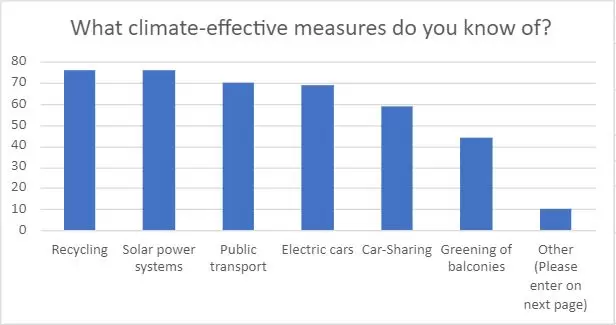
We can clearly see that the people know of climate-effective measures. However, are they already implementing them? This is what we asked them for our next question.
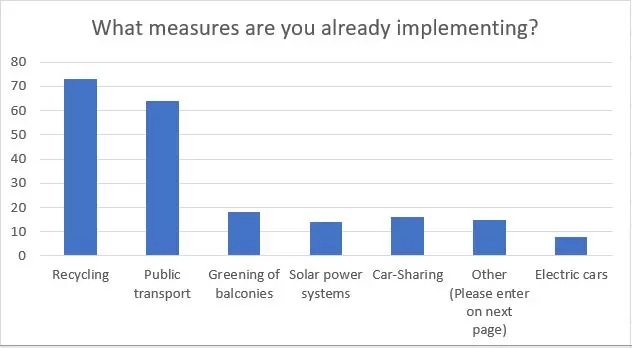
Recycling is the one which is known the most in our society. That is why people implement it the most. Electric cars are very expensive, which is probably the reason why people didn’t choose that one very often. We wanted to know why. So we asked them why they don’t implement certain measures.
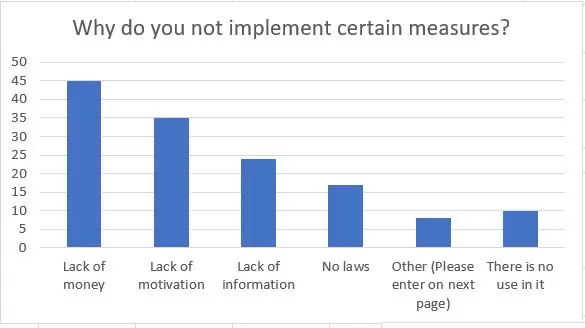
As you can see most people don’t implement measures, because they don’t have enough money. Slightly surprising many people answered the lack of information. As you can see the least chosen one was, because they see no use in it.
What would you need to do more for the climate?
People definitely need more money, as impacting measures isn’t always that inexpensive like for example solar systems or electric cars. Measures like the ones mentioned in our post should be more spread in our world, so people have better knowledge about it.
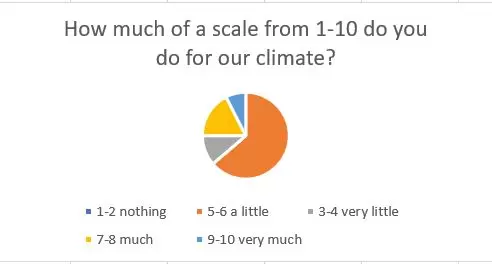
Only a few people think, they do much for our climate. The most chosen one from a scale from 1-10 was 5-6 which means they do a little to stop climate change.
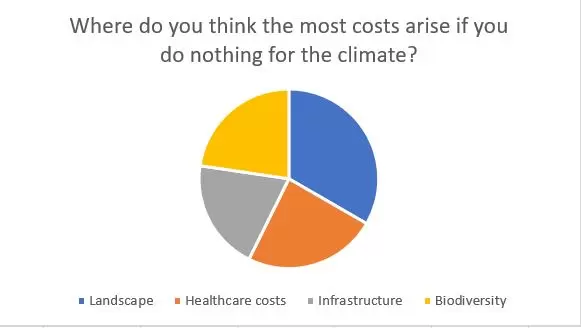
As this question is very difficult to answer it was especially interesting, what people think. As you can see biodiversity, infrastructure and healthcare costs were chosen almost the same amount of times. Landscape has been chosen a little more as it is possible that it will suffer a lot in the future. Even more than it does now.
How would you react if suddenly your district was only accessible by electric cars?
Many people would be mad, because they don’t have an electric car to drive this road. But if they say, from the year 2023, for example, your road can only be driven by electric cars, they would overthink their opinion, because they have some time to prepare themselves and to buy an E-Car.
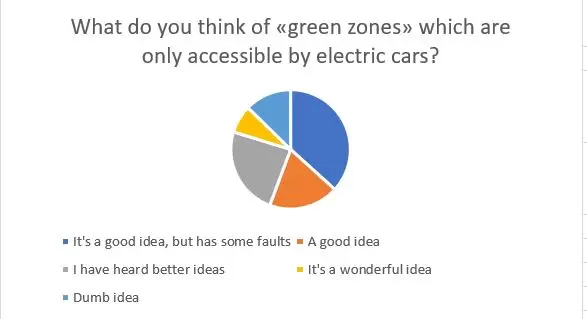
Surprisingly post people think it is a good idea. Firstly, it is surprising, because not everyone is able to afford an electric car, and they wouldn’t be allowed to drive this street anymore without one. Secondly it is also surprising when you compare the answers with the ones from the question before.
How do you imagine the city of the future?
People answered that they imagine the future with a lot of electric cars, recycling stations, that you don’t throw away waste at the floor, big companies with solar systems and green walls / roofs or electric cars. But even “probably ruined” was mentioned, because people aren’t motivated enough to change, which will be a problem for our future.
List five things a city of the future must have
- More plants
- less plastic
- more people who listen and are motivated
- more electric cars
- more solar panels
- Zero pollution (keine Luftverschmutzung)
- Green infrastructure
- Strong disaster management to handle natural calamities (Naturkatastrophen)
- Electric and flying vehicles only
- Natural energy resources
These were all things listed by people who answered our survey.
Reflection
At the beginning we had some difficulties to decide, which topic we’re going to choose. However, we decided on the topic of climate-changing measures because it was the only thing that we all agreed on.
Unfortunately, no one wanted to cooperate with us. But in our opinion it would have been much more complicated to do a collaboration, because our project is only based on a survey.
We didn’t have any struggles to decide who’s going to do what. It was also very interesting to do such a project in English. A bit sad is, that we didn’t get as many answers from our survey as we expected to. Even though we spread it in many ways. Although everything worked out, we couldn’t get much knowledge out of our project and would choose something different next time. But in the end, we’re happy with our final result.
Livia, Lukas and Julian
Image Sources for the header image collage
Photo by Joris Visser on Unsplash
Photo by E Mens on Unsplash
Photo by CHUTTERSNAP on Unsplash
On-topic contributions on dontwastemy.energy
City Parks and their impact on the environment
Cool city-climate
Electric cars in Zurich
City Traffic in Zurich
Urban gardening
What happens with a plastic bottle after it’s thrown into the recycling bin?
Green Roofs – lively green instead of dull gravel
Green walls for a green City!
☷ See the project teams here »
☵ Some words about the contributions »
☴ Our sponsors and partners » (the-horse.education)

Hey there!
In regards to a survey project I will be starting soon, I decided to read your post and maybe it will help me with my ideas. I liked the fact that you chose a topic that is rather abstract. I find it exciting to see what people think about a topic and am therefore a fan of such surveys anyway.
In my opinion, it is especially important in surveys to include the opinions of someone who can interpret more than other can. For such socio-psychological topics, a behavioural scientist would be a good choice. I saw that you had contact with a Mrs. Probst. As I understand it, this was only a short e-mail exchange. Would there have been more possible?
Back to the survey, I think it’s great that you got so many people to participate. I don’t think it’s easy to find enough people to get a reasonably logical picture. I also find the questions chosen appropriate. People were asked about their opinions and interesting answers came out. The fact that certain questions overlap also shows that people would like to do something for the environment, but not them personally.
Finally, I found this article interesting to read and it was great to see how some people relate to the world. Thank you!
I like the post very much. It is well written and understandable. The survey was beautifully designed.